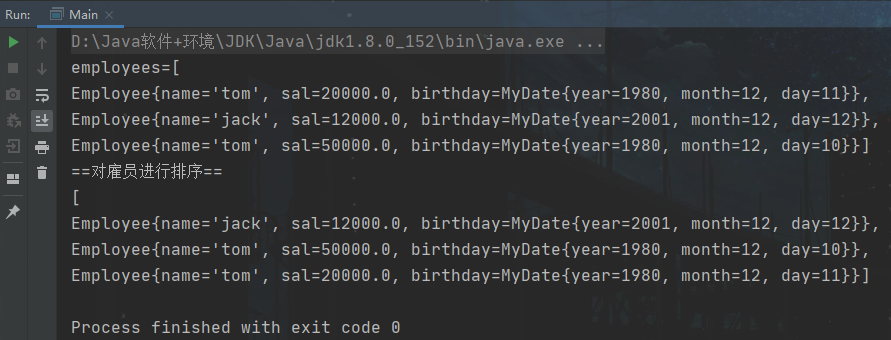需求:
定义Employee类
- 该类包含:private成员变量name,sal,birthday,其中 birthday 为 MyDate 类时对象;
- 为每一个属性定义getter, setter 方法;
- 重写toString方法输出name, sal, birthday
- MyDate类包含: private成员变量month,day,year;并为每一个属性定义 getter,setter方法;
- 创建该类的3个对象,并把这些对象放入ArrayList集合中 (ArrayList 需使用泛型来定义),对集合中的元素进行排序,并遍历输出:
排序方式:调用ArrayList 的sort方法,传入Comparator对象[使用泛型],先按照name排序,如果name相同,则按生日日期的先后排序。
解决:
Employee
package test;public class Employee {private String name;private double sal;private MyDate birthday;public Employee(String name, double sal, MyDate birthday) {this.name = name;this.sal = sal;this.birthday = birthday;}public String getName() {return name;}public void setName(String name) {this.name = name;}public double getSal() {return sal;}public void setSal(double sal) {this.sal = sal;}public MyDate getBirthday() {return birthday;}public void setBirthday(MyDate birthday) {this.birthday = birthday;}@Overridepublic String toString() {return "\nEmployee{" +"name='" + name + '\'' +", sal=" + sal +", birthday=" + birthday +'}';}}
MyDate
package test;public class MyDate implements Comparable<MyDate>{private int year;private int month;private int day;public MyDate(int year, int month, int day) {this.year = year;this.month = month;this.day = day;}public int getYear() {return year;}public void setYear(int year) {this.year = year;}public int getMonth() {return month;}public void setMonth(int month) {this.month = month;}public int getDay() {return day;}public void setDay(int day) {this.day = day;}@Overridepublic String toString() {return "MyDate{" +"year=" + year +", month=" + month +", day=" + day +'}';}@Overridepublic int compareTo(MyDate o) { //把对year-month-day比较放在这里int yearMinus = year - o.getYear();if(yearMinus != 0) {return yearMinus;}//如果year相同,就比较monthint monthMinus = month - o.getMonth();if(monthMinus != 0) {return monthMinus;}//如果year 和 monthreturn day - o.getDay();}}
Main
package test;import java.util.ArrayList;import java.util.Comparator;public class Main {public static void main(String[] args) {ArrayList<Employee> employees = new ArrayList<>();employees.add(new Employee("tom", 20000, new MyDate(1980,12,11)));employees.add(new Employee("jack", 12000, new MyDate(2001,12,12)));employees.add(new Employee("tom", 50000, new MyDate(1980,12,10)));System.out.println("employees=" + employees);employees.sort(new Comparator<Employee>() {@Overridepublic int compare(Employee emp1, Employee emp2) {//先按照name排序,如果name相同,则按生日日期的先后排序。【即:定制排序】//先对传入的参数进行验证if(!(emp1 instanceof Employee && emp2 instanceof Employee)) {System.out.println("类型不正确..");return 0;}//比较nameint i = emp1.getName().compareTo(emp2.getName());if(i != 0) {return i;}//下面是对birthday的比较,因此,我们最好把这个比较,放在MyDate类完成//封装后,将来可维护性和复用性,就大大增强.return emp1.getBirthday().compareTo(emp2.getBirthday());}});System.out.println("==对雇员进行排序==");System.out.println(employees);}}/*** 定义Employee类* 1) 该类包含:private成员变量name,sal,birthday,其中 birthday 为 MyDate 类的对象;* 2) 为每一个属性定义 getter, setter 方法;* 3) 重写 toString 方法输出 name, sal, birthday* 4) MyDate类包含: private成员变量month,day,year;并为每一个属性定义 getter, setter 方法;* 5) 创建该类的 3 个对象,并把这些对象放入 ArrayList 集合中(ArrayList 需使用泛型来定义),对集合中的元素进行排序,并遍历输出:** 排序方式: 调用ArrayList 的 sort 方法 ,* 传入 Comparator对象[使用泛型],先按照name排序,如果name相同,则按生日日期的先后排序。【即:定制排序】*/



